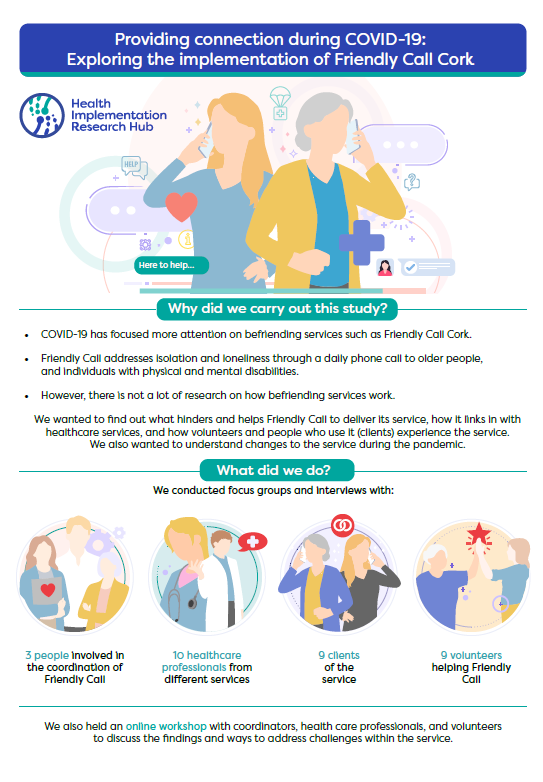Learning to created integrated community Networks through Knowledge exchange (LINK)
As part of the LINK (Learning how to create Integrated community Networks through Knowledge exchange) project, funded by an Irish Research Council New Foundations Award, the team partnered with a local befriending service Friendly Call Cork, to understand changing service delivery during the COVID-19 pandemic, and explore how to maximise its potential through integration with community healthcare services. Dr Sheena McHugh was the Principal Investigator, and Dr Fiona Riordan was the lead researcher working on the study.
Why did we do this research?
COVID-19 increased the focus on befriending services, like Friendly Call, as a way to connect with and support older people and individuals with physical and mental disabilities who may be vulnerable, cocooning, and lonely. Integrating and coordinating health and social care services around an individual’s needs, is posited to improve quality of care, user satisfaction and health system efficiency. Befriending is a potentially effective, valued, and increasingly in demand service, yet its capacity to reach and support many older and vulnerable adults in the community, often with chronic conditions, is underutilised and under-researched. Systematically linking the service with other community healthcare providers, would optimise its potential as part of an integrated and cohesive network around vulnerable adults. However, the process by which befriending services reach out to community healthcare services and the latter reach in, is not well understood.
What was involved?
We analysed the client database to understand current integration, and conducted interviews or focus groups with Friendly Call staff, volunteers, and health care professionals working in the community who may have referred into the service. In November 2021, we conducted a participatory workshop with clients, volunteers, and health care professionals to co-produce an action plan for the service. In May 2022, we hosted a webinar to disseminate the findings and launch the report.
LINK project outputs
Publications
- Riordan F, van de Water T, McHugh S. LINK: Learning to create Integrated community Networks through Knowledge exchange. Project Report. 2022. Download LINK report
Presentations
- Webinar “Providing connection during COVID-19: Exploring the implementation of Friendly Call Cork”, Thursday 26th May 2022. A recording of the webinar can be accessed here.
-
UCC College of Medicine and Health conference 'From molecules to people' (Online poster). “Understanding the implementation of a befriending service to support the needs of isolated vulnerable adults in the community: A rapid analysis”. Presenter: Fiona Riordan, 22nd September 2022
Research Summaries
- Download LINK infographic


